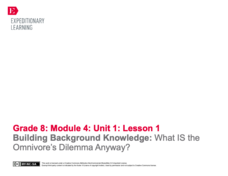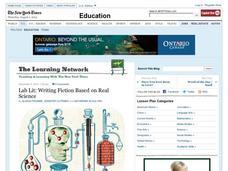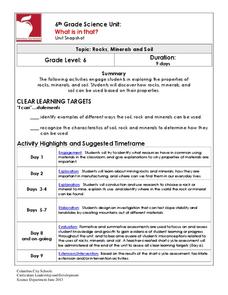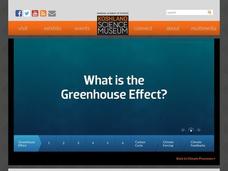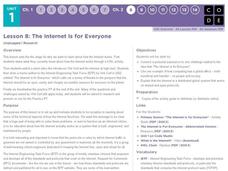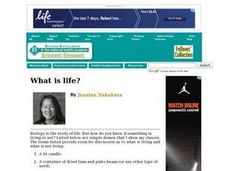Bonneville
Setting Expectations for Science and Engineering Projects
What is science? Sitting in a whole group discussion, scholars first share their ideas on science and how to conduct investigations. They learn about the steps for scientific inquiry and experimentation. Once finished, individuals then...
Howard Hughes Medical Institute
Classroom Activities: What Is My Carbon Footprint?
Everyone leaves an impression on the world—some more than others. An interactive lesson has learners analyze their lifestyles and the impact they have on the environment. The analysis includes travel, food, and energy categories and ends...
Nuffield Foundation
How Much Energy Is There in Food?
People associate calories with food, but what is a calorie? Young scientists measure the number of calories in samples of food to better understand the concept. They test a variety of samples, take measurements, and compare their results...
EngageNY
Building Background Knowledge: What IS the Omnivore’s Dilemma Anyway?
What's the best thing on the menu? Scholars enter the room, complete a gallery walk of menus to choose a food to pretend to order, and then discuss how they made the decision. Next, they read The Omnivore's Dilemma and relate their...
EngageNY
Building Background Knowledge and Making Inferences: What Is a Natural Disaster?
That's a disaster! Scholars complete a gallery walk to view images and make inferences about natural disasters. They fill out a note catcher about what they observe and infer any questions they may have. They then participate in a World...
The New York Times
Writing Fiction Based on Real Science - NYTimes.com
Refuse to alienate your scientific-minded young scholars during your creative writing unit. Learners explore how literary writing can reflect observable fact, and be based in actual science. The links include examples of fiction and...
Columbus City Schools
What is in that?
Invite your class to dig in to an engaging journey into the world of mining! Here you'll find the tools to equip young miners with knowledge of soil, rocks, and minerals, as well as types of mining operations. To round things out, the...
Curated OER
What is Earth Science?
This worksheet tests general knowledge of scientific fields with a focus on those involved in earth science. Learners fill in 9 blanks using the provided word bank of scientific fields. In addition, there are 2 questions specifically...
Curated OER
What is a National Forest
Students select and research a National Forest near their local community. They read and discuss the pamphlet "A Guide To Your National Forests," view photos of national forests, conduct Internet research, and complete the student...
Curated OER
What is Made From Plastic?
For this what is made from plastic worksheet, students identify items made from plastic and illustrate them. Students fill five boxes with drawings of items made from plastic.
Curated OER
What Is Made From Wood?
In this what is made from wood worksheet, students identify and illustrate pictures of items made from wood. Students draw four pictures.
Curated OER
What Is Made From Metal?
In this what is made from metal learning exercise, students identify and illustrate items made from metal. Students draw four pictures.
Curated OER
Polar Scientists: Polar Science
Research skills are extremely important and they can be linked to any subject. Get your class thinking about scientists that study the polar region, what they do, and how they get funded to continue their research. Each child uses a...
Kenan Fellows
What Is Heat?
If objects have no heat, how do they can gain and lose it? Scholars experiment with heat, temperature, and specific heat of various substances. They create definitions for these terms based on their own conclusions to complete the fourth...
Curated OER
How To Make a Science Concept Map
Here is a clever way to get your pupils thinking about a science topic they'd like to research for a report, or a project they'd like to do for a science fair. The three-step process is easy to follow, and it really should help your...
National Academy of Sciences
What is the Greenhouse Effect?
The greenhouse effect warms up earth enough so it can support life, but if it heats up too much, life won't be able to survive. An interactive presentation covers the greenhouse effect, the carbon cycle, climate forcing, and climate...
Teach Engineering
What is a Nanometer?
Teams learn about the size of a nanometer by measuring objects and converting those measurements. A learning exercise then tests the groups' abilities to use nanometers by having them determine the size of objects that are too small to...
Curated OER
Mentos Geyser! What's the Fizz Factor?
What is it that makes Mentos candy and cola such an explosive combination? Find out through scientific inquiry and experimentation. This presentation walks learners through the scientific process and allows them to speculate whether it...
Code.org
The Internet Is for Everyone
What is this thing called the Internet? A KWL activity elicits what the class knows about how the Internet works. Then pupils read a copy of a memo about the need to keep the Internet open and accessible by everyone.
Space Awareness
Water is a Heat Sink
One of the key objectives of Europe's Copernicus Earth program is to monitor the temperatures of the oceans and seas on Earth. Young scholars learn the effects of different heat capacities through two experiments. These experiments...
Michigan State University
What is IPM?
Learners view a plastic cockroach, mouse, or picture of a pest and discuss if they belong inside the house or school. They discuss what a pest is and brainstorm what makes it a pest and ways to get rid of them. They then discover dangers...
Curated OER
What is Life? Demonstrations & Discussion
Display seven items for your biologists to consider. Are they living or non-living? How can you tell? This is a simple outline of what you can display and questions that can be discussed as this topic is explored. One way to use this...
Curated OER
What is Logging?
Future forestry fanatics absorb information about the impact of the logging industry and then answer ten questions. Everything is included on one webpage, so consider having learners write out their answers on a separate piece of paper....
San Francisco Public Utilities Commission
What is Groundwater? Our Underground Water Supply
Learn about the consequences of groundwater with a lesson about the different ways California handles water conservation and pollution. After reading a passage about the water table, learners apply what they have read to six...
Other popular searches
- What Is Science Important
- What Is Science Worksheets
- Science What Is Science
- What Is Science Fiction
- What Is Science Worhsheets
- What Is a Science Theory
- What Is Science Skills?
- What Is Science Florida
- Science What Is a Rock?



